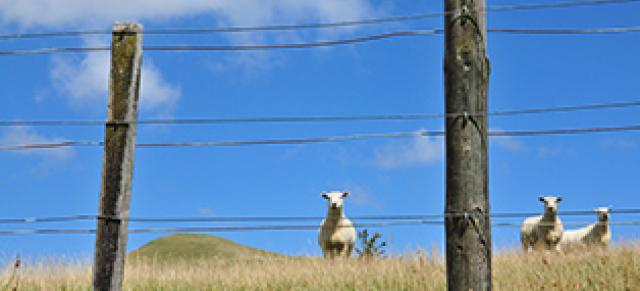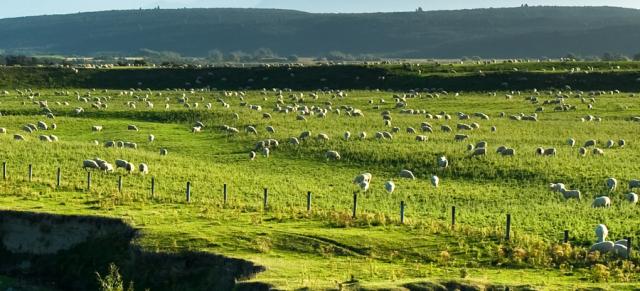Disease prevention and control require regular attention to stock health, knowledge, planning, good record keeping and compliance with domestic regulations. Explore recommended practices and specific diseases and issues below.
Recommended practices
Prevention
- Prevention is hugely important: develop a farm animal health plan or calendar with your veterinarian. This will include vaccination and drench programmes appropriate to the needs of your farm business.
- Consider buying stock on the basis of a high breeding value for disease resistance where this is available.
- Check the animal health details of incoming animals and isolate and treat those animals if their health status is lower than existing animals.
- Regularly worm farm dogs and prevent the access of other dogs onto the property – dogs can spread disease to your stock.
Treatment
- Regularly inspect your animals and know the signs of disease to ensure problems are detected early.
- Seek early advice from a veterinarian in relation to any unusual signs, sickness or death or where a large number of animals are affected. Isolate and treat animals appropriately for the specific infection they are suffering from—including animals in the mob that do not yet show signs if this is recommended.
- Always follow veterinary or label advice when using veterinary medicines or other agricompounds and ensure that you observe withholding periods. Using inappropriate drugs will fail to kill the pest and not finishing courses of drugs can lead to drug resistance.
- Ensure that you use clean needles or syringes when vaccinating, and that you follow the advice of your veterinarian with regards to good management practice when vaccinating or drenching animals. Certain diseases can be spread from animal to animal through the use of contaminated needles or equipment.
- Maintain thorough records of animal health activities and treatments—preferably for each animal but at least to the mob level.
Specific diseases and issues
Bovine TB is an infectious disease caused by the bacterium Mycobacterium bovis, which can affect a wide range of animals. It is one of the world's most serious animal health problems and, in many parts of the developing world, still a major killer. In New Zealand, cattle and deer are the species most at risk of contracting the disease, with possums and ferrets the main carriers. Anyone who owns or is in charge of cattle and deer – even if it is only one animal – has to register with OSPRI's TBfree programme.
TBfree is a nationwide programme of livestock testing and pest control that exists to eliminate Bovine TB, with the aim of eradicating the disease from livestock by 2026, from possums by 2040 and from New Zealand by 2055.
To control the spread of the disease among infected herds and herds in high TB risk areas, all herds must be registered and stock tagged correctly.
To find out more, visit the Ospri website
With at least 60% of cattle in New Zealand exposed to BVD (bovine viral diarrhoea), the viral disease is responsible for significant production losses to both the dairy and beef industries.
With a strong economic need for control of the disease, the BVD steering committee is currently exploring the possibility of a national BVD control programme. B+LNZ is supportive of increasing voluntary management of BVD based on farmer education and potentially involving the use of NAIT to support informed purchasing decisions by farmers.
To find out more, visit the Control BVD website.
Wormwise is the national worm management strategy which aims to help farmers and their advisors manage internal parasites in sheep and beef. Drench resistance is a widespread problem amongst sheep and cattle and the Wormwise website provides farmers with comprehensive information about:
- drenches and drench resistance
- principles for managing internal parasites
- tools and techniques you can use.
Wormwise workshops
We run Wormwise workshops 'on demand' for farmers throughout the country, facilitated by trained professionals and run for groups of 10 to 15 farmers. The workshops cover what's involved in being 'Wormwise' and cover topics such as practical tools to delay the onset of drench resistance, sustainable management techniques and understanding parasite biology. To request a workshop, contact your local extension manager.
Sheep measles (Taenia ovis) is a parasite of sheep that is spread by dogs. It poses no risk to human health however it does cause blemishes in sheep meat which can result in downgrading or in extreme cases condemning of sheep or lamb carcasses. Dogs become infected by eating raw sheep or goat meat, including the heart, infected with live cysts. Infected dogs pass many thousands of eggs in their faeces contaminating pasture grazed by sheep and goats – this can infect a farm for up to six months.
Of all the control measures for prevention, regular dog treatment is the most reliable and simple (and probably the cheapest) measure to implement. Dog treatments and dosing should form the basis of any on-farm control programme.
Visit the Sheep Measles website to find information and advice on reducing the risk to sheep and goats, plus information for dog owners on how they can prevent their dogs spreading the eggs of Taenia ovis.

